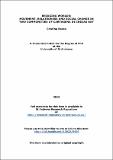Bridging worlds : movement, relatedness and social change in two communities of Cartagena de Indias Bay
Abstract
The island of Barú, located along the Atlantic coast of Colombia, has occupied, since the
colonial era, a geographical and social interstitial position. The island was a strategic space
in key processes and events of colonial and national modernity. Its inhabitants have combined
movement and interaction across geographical spaces and social groups with retreat and
relative closure.
The historical experiences of dislocation and of marginality have shaped local modes of
relatedness and particular ways of signifying and narrating “family”, masculinities and
femininities, the divine and the wondrous.
State and capital’s progressive encroachment over the Island trans-territory has recently
undergone a conspicuous acceleration. Moreover, new religious organizations have
influenced the ways in which people think and talk about identity, local forms of sociality and
religiosity.
“Development” and ethnicity-based identity politics have functioned as identity-,
community- and memory (re-)making devices. Various political and economic actors
currently envision and try to implement projects of “place” which commoditize the island and
aim to reshape local subjectivities and relational modes according to market-oriented values.
Type
Thesis, PhD Doctor of Philosophy
Collections
Items in the St Andrews Research Repository are protected by copyright, with all rights reserved, unless otherwise indicated.

